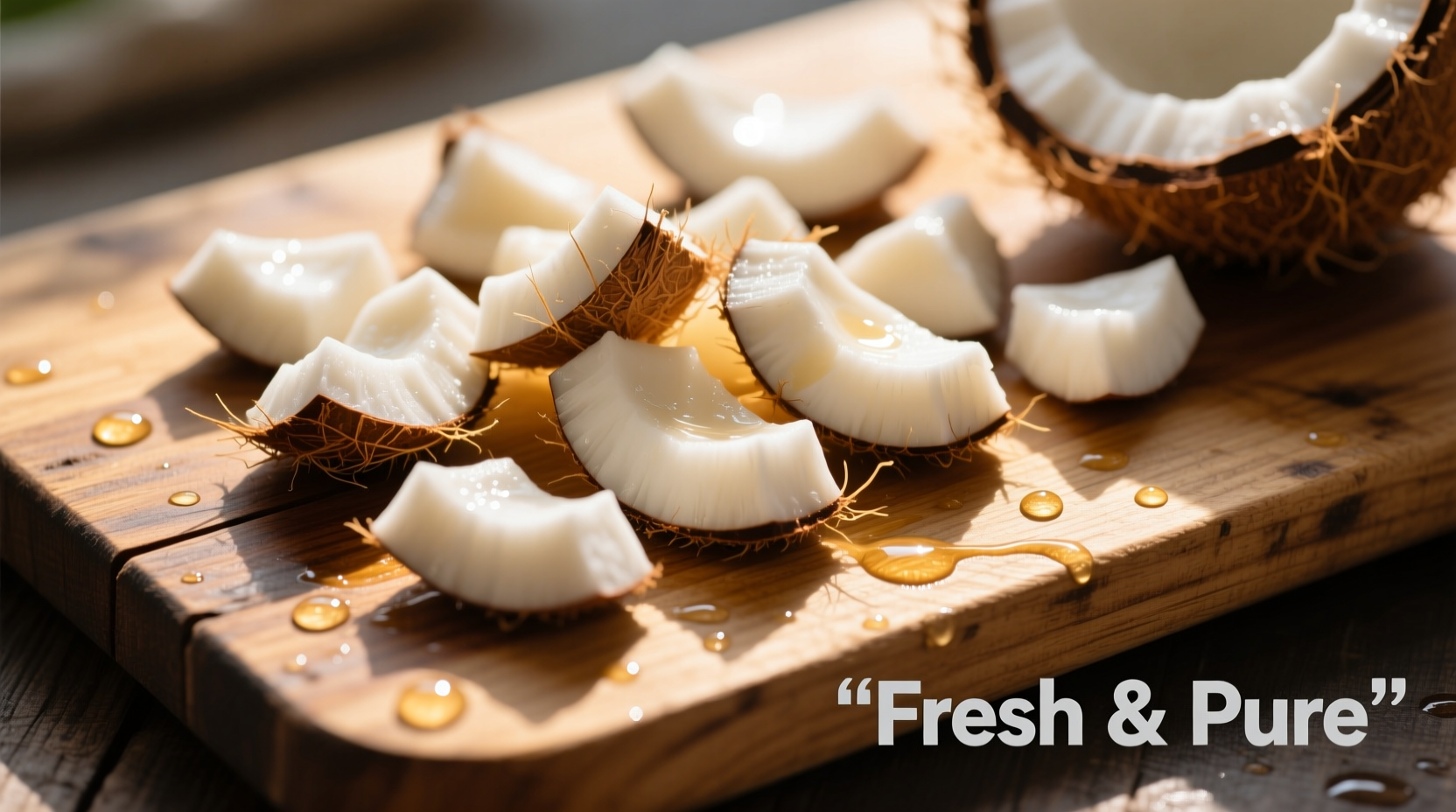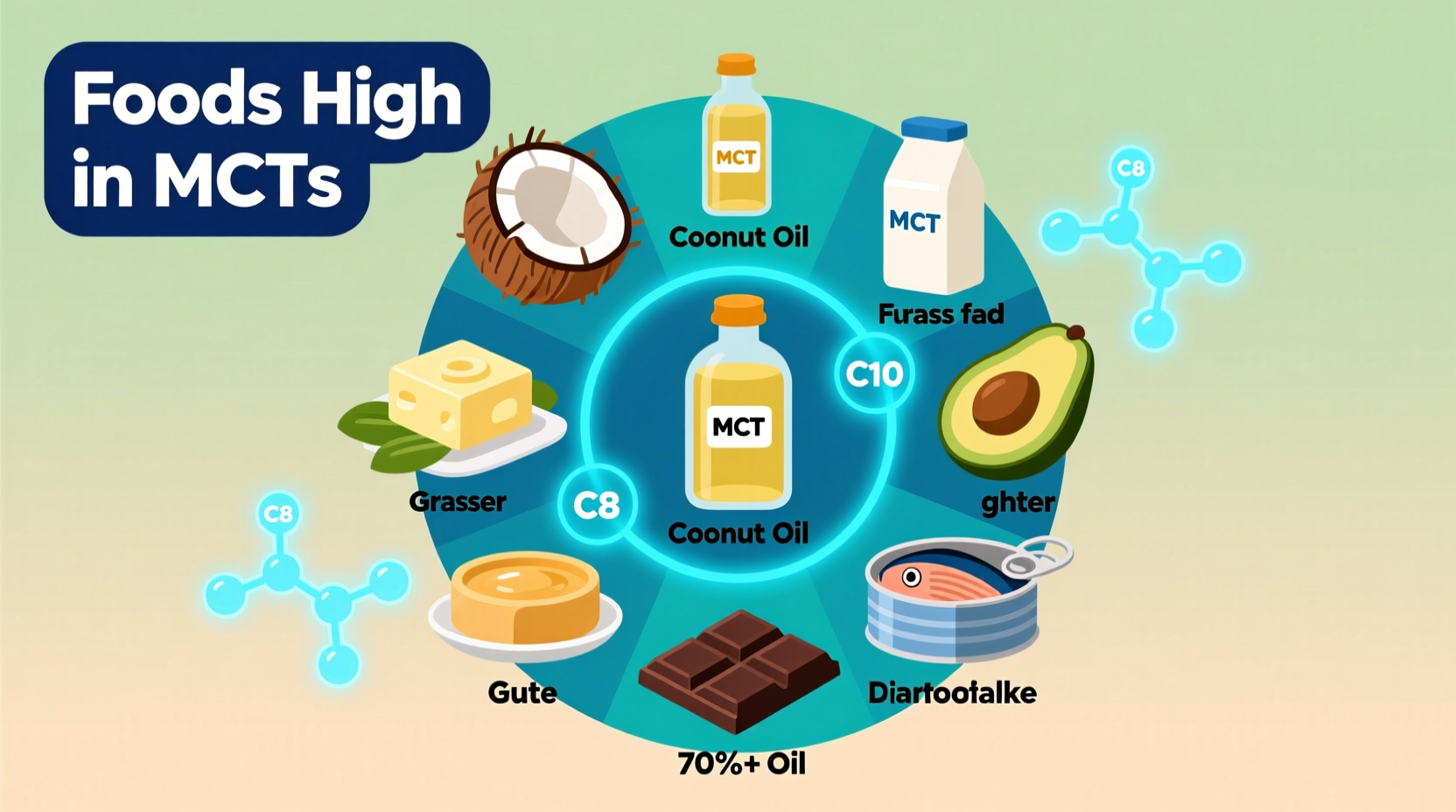The top natural food sources high in MCTs (medium-chain triglycerides) are coconut oil (54-58% MCT content), palm kernel oil (approximately 48% MCTs), and full-fat dairy products like butter and cheese (10-15% MCTs). These foods provide readily absorbable fats that support energy production, ketosis, and metabolic health without requiring bile for digestion.
Understanding MCTs: Nature's Quick Energy Source
Medium-chain triglycerides (MCTs) represent a unique category of dietary fats that bypass normal fat metabolism pathways. Unlike long-chain triglycerides (LCTs) found in most fats and oils, MCTs travel directly from your gut to your liver, where they're rapidly converted into ketones for immediate energy. This distinctive metabolic pathway makes MCTs particularly valuable for people following ketogenic diets, athletes seeking quick energy, and those with fat malabsorption issues.
While MCT oil supplements have gained popularity, numerous whole foods naturally contain significant MCT concentrations. Understanding these natural sources helps you incorporate MCTs into your diet without relying solely on processed supplements.
Top Natural Food Sources of MCTs
Coconut: The MCT Powerhouse
Coconut products reign supreme as the most abundant natural source of MCTs. The fat composition of coconut is approximately 60-65% MCTs, with lauric acid (C12) comprising the largest percentage. While technically classified as an MCT, lauric acid behaves more like a long-chain fatty acid in the body. More valuable for immediate energy are the shorter-chain MCTs like caprylic acid (C8) and capric acid (C10) found in coconut.

When selecting coconut products for MCT content:
- Virgin coconut oil contains 54-58% MCTs
- Full-fat coconut milk provides 20-25% MCTs by fat content
- Unsweetened coconut flakes deliver approximately 15g of MCTs per 100g
| Coconut Product | MCT Content | Best Uses |
|---|---|---|
| Virgin Coconut Oil | 54-58% of total fat | Cooking, baking, coffee additive |
| Full-Fat Coconut Milk | 20-25% of total fat | Curries, smoothies, sauces |
| Unsweetened Coconut Flakes | Approx. 15g per 100g | Snacking, baking, toppings |
Palm Kernel Oil: The Underutilized MCT Source
Often confused with palm oil, palm kernel oil comes from the seed of the oil palm fruit rather than the fruit pulp. This distinction matters because palm kernel oil contains approximately 48% MCTs, primarily lauric acid (C12), while regular palm oil contains mostly LCTs.
According to the USDA FoodData Central, palm kernel oil's composition makes it the second richest natural source of MCTs after coconut. However, sustainability concerns surrounding palm oil production warrant consideration when choosing this option. Look for RSPO (Roundtable on Sustainable Palm Oil) certified products if incorporating palm kernel oil into your diet.
Dairy Products: Traditional MCT Sources
Full-fat dairy products contain smaller but significant amounts of MCTs, typically comprising 10-15% of their total fat content. The MCTs in dairy primarily include caproic acid (C6), caprylic acid (C8), and capric acid (C10).
Research published in the Journal of Functional Foods confirms that grass-fed dairy products contain slightly higher concentrations of beneficial fatty acids, including MCTs. When selecting dairy for MCT content:
- Butter: Contains approximately 7-10% MCTs by fat content
- Hard cheeses (like cheddar): Provide 10-12% MCTs
- Whole milk: Contains about 10% MCTs of total fat
Practical Ways to Incorporate MCT-Rich Foods
Adding MCT-rich foods to your daily routine doesn't require dramatic dietary changes. These practical strategies help you maximize MCT intake through enjoyable eating experiences:
Morning Metabolism Boosters
Start your day with MCT-enhanced beverages that provide sustained morning energy. Try blending 1 tablespoon of virgin coconut oil into your coffee or smoothie. This simple addition delivers approximately 14g of MCTs while creating a creamy texture without dairy.
Culinary Applications
Coconut oil's high smoke point (350°F/177°C) makes it suitable for medium-heat cooking methods. Use it for:
- Sautéing vegetables
- Stir-frying proteins
- Baking代替 butter in recipes
For dairy-based MCT sources, incorporate full-fat Greek yogurt with coconut flakes and nuts for a balanced breakfast that provides both protein and sustained energy from MCTs.
MCTs vs. Other Fats: Understanding the Metabolic Difference
The unique metabolic pathway of MCTs explains their growing popularity in therapeutic diets. While LCTs require bile salts for emulsification and travel through the lymphatic system before entering circulation, MCTs move directly to the liver via the portal vein.
This difference creates several practical benefits:
- Faster conversion to energy (within minutes rather than hours)
- Increased ketone production for brain fuel
- Reduced fat storage potential compared to LCTs
- Better absorption for individuals with compromised digestive systems
According to research from the Mayo Clinic, these properties make MCTs particularly valuable for people with malabsorption conditions, those following ketogenic diets for neurological conditions, and athletes seeking rapid energy sources.
Common Misconceptions About MCTs in Foods
Several myths persist about MCTs in natural food sources that deserve clarification:
MCT Content Varies Significantly
Not all coconut or dairy products contain equal MCT concentrations. Processing methods, plant variety, and animal diet significantly impact MCT levels. For example, refined coconut oil loses some volatile MCT compounds during processing compared to virgin coconut oil.
Natural Sources vs. Supplements
MCT oil supplements typically contain concentrated C8 and C10 MCTs (80-100%), while natural food sources provide a broader spectrum of fatty acids including lauric acid (C12). Each has distinct benefits: natural sources offer additional nutrients and fiber, while supplements provide higher concentrations of specific MCT types.
Digestive Considerations
While MCTs are generally well-absorbed, consuming large amounts from natural sources can cause digestive discomfort in sensitive individuals. Start with small portions (1-2 teaspoons of coconut oil) and gradually increase to assess tolerance.
Scientific Evidence and Practical Recommendations
Current research suggests that incorporating 5-15g of MCTs daily from natural food sources provides noticeable benefits without adverse effects for most people. The American Journal of Clinical Nutrition notes that regular consumption of MCT-rich foods may support weight management, cognitive function, and athletic performance.
When planning your MCT intake, consider these evidence-based recommendations:
- For general health: 5-10g MCTs daily from natural sources
- For ketogenic diets: 15-20g MCTs daily, combining natural sources and supplements
- Distribute intake throughout the day to optimize utilization
- Pair MCT-rich foods with fiber sources to support digestion
Remember that MCTs are still fats and contain 8.3 calories per gram (slightly less than LCTs' 9 calories per gram). Account for these calories in your overall dietary plan to avoid unintended weight gain.
Frequently Asked Questions
Which natural food has the highest concentration of MCTs?
Virgin coconut oil contains the highest natural concentration of MCTs at 54-58% of its total fat content, making it the most potent whole food source available.
Can I get enough MCTs from food alone without supplements?
Yes, you can obtain sufficient MCTs through strategic consumption of coconut products, palm kernel oil, and full-fat dairy. Most people achieve 5-15g daily through natural sources, though therapeutic protocols may require supplementation.
Do MCTs in natural foods provide the same benefits as MCT oil?
Natural food sources provide a broader spectrum of fatty acids including lauric acid (C12), which has antimicrobial properties. While supplements offer higher concentrations of C8 and C10 for rapid ketone production, whole food sources deliver additional nutrients and fiber.
Are there any risks associated with consuming MCT-rich foods?
MCT-rich foods are generally safe, but excessive consumption (more than 50g daily) may cause digestive discomfort. Individuals with liver conditions should consult healthcare providers before significantly increasing MCT intake, as the liver processes these fats.











 浙公网安备
33010002000092号
浙公网安备
33010002000092号 浙B2-20120091-4
浙B2-20120091-4